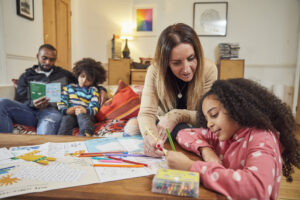 As parents we want to do everything we can to help keep our children safe, but at the NSPCC we understand that starting conversations about child sexual abuse with children can seem quite daunting, and it can be difficult to know how to approach such difficult topics.
As parents we want to do everything we can to help keep our children safe, but at the NSPCC we understand that starting conversations about child sexual abuse with children can seem quite daunting, and it can be difficult to know how to approach such difficult topics.
The NSPCC has been using the PANTS rule for almost 10 years to help parents have these conversations, in a style that is very age appropriate.
You know your child better than anyone, and you’ll know when they’re ready and how much detail to go into, but our friendly dinosaur, Pantosaurus, with his singing video and activity packs can help guide your conversations.
The PANTS rule is really simple:
Privates are private – your underwear covers up your private parts and no one should ask to see or touch them. Sometimes a doctor, nurse or family member might have to, but they should always explain why and ask you if it’s OK first.
Always remember your body belongs to you – no one should ever make you do things that make you feel embarrassed or uncomfortable. If someone asks to see or tries to touch you underneath your underwear, say ‘no’ and tell someone you trust and like to speak to.
No means no- and you always have the right to say no, even to a family member or someone you love.
Talk about secrets that upset you. There are good and bad secrets – good secrets can be things like presents for other people or surprise parties. Bad secrets make you feel sad, worried or frightened. You should always tell an adult you trust about a bad secret straight away.
Speak up, someone can help. If you ever feel sad, anxious or frightened, you should talk to an adult you trust.
We also know that sometimes it can be difficult for children to talk to people they know about things that they are worried about, even their parents.
You can let your child know the Childline number (0800 11 11) and website (childline.org.uk), so if they ever feel unsure they can speak to our counsellors for reassurance and support in the first instance.
There is also lots of information on the Childline and NSPCC websites for advice and support for whatever is going on in your child’s life.



